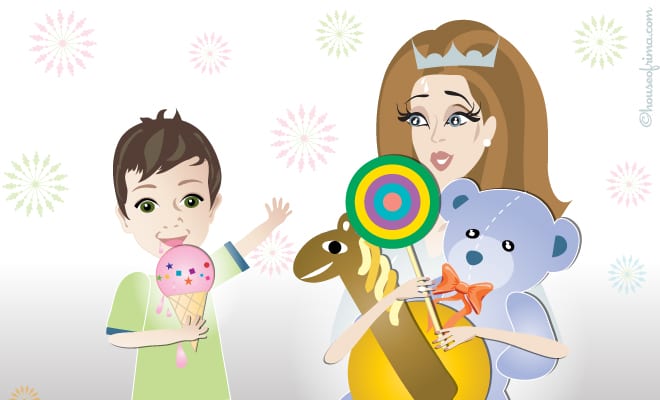 “Bad habits are like a comfortable bed, easy to get into, but hard to get out of.” – Anonymous
“Bad habits are like a comfortable bed, easy to get into, but hard to get out of.” – Anonymous
“Good boy!” My toddler says those two words like they are magic. He points at himself proudly. “I no hit Sienna. Cookie.” He waits for his reward. But I just look at him with a note of dismay, so he adds another magic word. “Please.”
When did Alessio get in the driver’s seat and start demanding rewards instead of earning them? It seems to have crept out of nowhere. Akin to watching a horror film, where the stalker materializes out of thin air.
At first the cookies were a special treat. He got them once in a while, always linked to accomplishing something that was hard for him or new. Incentives, I called them back then. Now the word incentive has been replaced with a more accurate one: Bribe.
I try to explain why not hitting his little sister isn’t worthy of a cookie, though in Alessio’s mind, hitting Sienna is the worst thing he could do, and so not doing it must be the best thing he could do. Clearly he’s not getting the point about what good behavior is, besides a mouthful of chocolate.
It doesn’t stop at a cookie, I think. The bribes will have to get bigger and bigger. Like any habit, it grows. I shudder as I picture my son as a snarling teenager, asking to borrow the car and expecting a reward for not getting into a wreck. But then I think again: If bad habits can grow, good habits can too.
Bribery. Motivation. Incentives. In a kid’s world, they are all mixed up. Desperate parents can add to the confusion.
Our children get their emotional cues from us. Bribery sends an underlying signal that the act itself isn’t enough. He’s not likely to want to do this, and so we have to cheat in a way. It’s an easy trap many parents fall into, including me. So you’ve got the pint-sized extortionist on your heels. What do you do?
Developmentally, a child under four doesn’t understand the emotional consequences of an action. Parenting at this stage is to help your child see the larger perspectives by talking about emotions. I liked how you did this. It makes me feel happy. Or Now Sienna is crying. You hurt her and she is sad.
Notice when they are doing something great, including acts of kindness. Praise them for it. This helps them associate social skills with generosity and thoughtfulness. Smiles, appreciation and hugs are rewards, too, that reinforce the positive actions which become habits over time.
Learning responsibility and self-discipline have big payoffs down the road. Studies show that children who learn self-control early have better lives later in terms of health, happiness and success. Sometimes parents have to be part-genius, part-lawyer to negotiate even with a toddler! But don’t give up. Stubbornness has its rewards too.
What is the most outlandish bribe you have offered your little angel?
Ciao,
Princess Ivana
www.princessivana.com
Ivana is a modern princess married to a real Italian prince! Follow the Modern Princess on Facebook and Twitter 2PrincessIvana.
Illustration by Rima Hawkes Graphic Design





